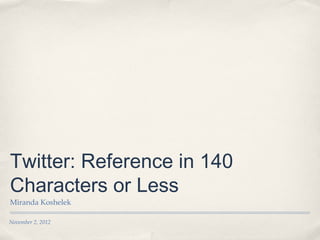Twitterreference
- 1. Twitter: Reference in 140 Characters or Less Miranda Koshelek November 2, 2012
- 2. Reference Services on Twitter
- 3. Whoâs Helping? âĪ For this project, I followed a number of different librarians. These were the most active in twitter reference
- 4. How to Find Questions âĪ Direct Tweets and Private Messages âĪ Hashtags âĪ Some useful ones may be #enquire, #refdesk, or #answers âĪ Advanced Search âĪ Twitter users can search using key words (eg. library) and may use boolean operators (eg. cite AND paper)
- 5. How to Find Questions âĪ Although direct tweets are easiest to access, they are also fairly rare âĪ Most of the reference I observed occurred when the librarian approached the information-seeker (a manifestation of embedded librarianship)
- 6. How to Answer âĪ Answers may be presented in 2 styles âĪ 1. Written in 140 characters or less âĪ 2. Given via link in tweet
- 7. Challenges âĪ 1. Many reference questions cannot be answered in 140 characters (to any level of quality) âĪ 2. Reference questions requiring a reference interview can be difficult to conduct. Conversations can be long, and ultimately, abandoned.
- 8. Challenges âĪ 3. The biggest challenge is engagement. Of those twitter accounts I followed, most of the tweets were advertising library service (including twitter reference) rather than conducting any actually reference assistance.
- 9. Should Libraries Bother with Twitter Reference? âĪ Erin Fields in her 2010 article, âA Unique Twitter Use For Reference Service,â identifies tweeting reference desk questions as a useful behaviour. âĪ It communicates the type of research being done at an institution âĪ Demonstrates the types of questions librarians can answer âĪ Ultimately, it becomes a valuable promotion tool
- 10. What Does the Future Look Like? âĪ It seems that, for the time being, twitter is here to stay. While its strength may not be in providing high-quality reference, it may certainly be a valuable tool to be used in conjunction with other services offered to distance users. âĪ These services may include chat reference, email reference, etc. âĪ Ultimately, twitter creates an access point for reference services outside of the traditional reference model. The ease of which librarians and information-seekers may collaborate is not equalled in any other media, and creates an environment where embedded librarianship may thrive.
- 11. @PractRef âĪ I have set up a twitter account for reference service. The purpose behind it is to practice/see examples of reference on twitter. âĪ Give it a try! I welcome any and all tweets :) âĪ Twitter handle: @PractRef
- 12. Sources & Further Reading âĪ List of libraries on twitter: http://www.libsuccess.org/index.php?title=Twitter âĪ Burkhardt, Andy. âAmbient Awareness in Twitter for Referenceâ http://andyburkhardt.com/2010/02/12/ambient-awareness-in- twitter-for-reference/ âĪ Fields, Erin. âA Unique Twitter Use for Reference Services.âLibrary Hi Tech News, No. 6/7, 2010. âĪ Milstein, S. ââTwitter for Libraries and Librariansââ, Computers in Libraries, Vol. 29 No. 5, 2009.












